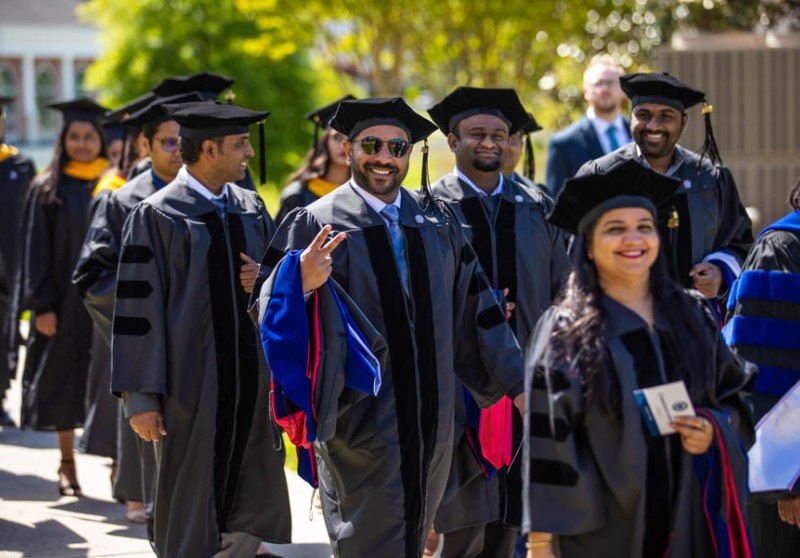Prepare to provide guidance on financial decisions made by households and businesses alike.
Meet growing demand for skilled financial experts with an executive master’s degree in finance. This program focuses on the expertise needed to become a competent financial professional who is both knowledgeable and astute in the various areas of financial practice. The executive master’s in finance at University of the Cumberlands is designed to equip you with the analytic skills and theoretical tools required for a wide range of careers in the world of finance. The program’s rigorous, yet flexible, cutting-edge curriculum and expert faculty will provide the foundational knowledge and research methodology you need to master practical issues in finance, and they'll prepare you to earn some of the most popular financial certifications, such as the Chartered Financial Analyst (CFA) or Certified Financial Planner (CFP).
By the Numbers
Programs & Requirements
Executive Master of Science in Finance (MSF)
It's time to take the next step in your financial career – and your financial future. The executive master’s degree in finance (MSF) at University of the Cumberlands is intended for working professionals seeking the advanced credentials and expertise required to achieve long-term success. Designed for candidates with a bachelor’s degree in business or a relevant field, the program will build on your past experience and business acumen to help you prepare for new challenges.
The program coursework is designed with illustrative case studies, participatory simulations, and computerized finance models that provide a thorough understanding of present-day financial theories and practices that are vital to the financial industry. Between online coursework and the schoolwork you do on campus during residency weekends, by the time you graduate, you will be prepared for advanced roles in finance.
Course Requirements
- BACC 681 - Financial Accounting and Analysis
- BADM 682 - Quantitative Methods for Finance
- BADM 683 - Financial Services, Regulation, and Ethics
- BADM 684 - Financial Modeling and Valuation
- BADM 685 - Economics Analysis for Decision Making
- BADM 686 - Corporate Finance
- BADM 687 - Financial Planning and Wealth Management
- BADM 688 - Big Data and Financial Analytics
- BADM 689 - Global Capital Markets and International Finance
- BADM 691 - Capstone - Strategic Financial Management
- BADM 699 - Capstone (1 hour) or INTR 599 Applied Learning Practicum (1 hour)
*All online students who are seeking to earn this degree must take this course in lieu of INTR 599, in addition to meeting all program degree requirements. Executive format students can substitute the required INTR 599 course in lieu of BADM 699 as part of their program degree requirements.
** Executive format programs have an applied learning component (internship or practicum) that is an integral and essential part of the established curriculum. Due to the applied learning component required for the degree program, Executive format students must enroll in INTR every term of enrollment.

Executive Student Resources
UC's Department of International Graduate Services enjoys providing support resources for our international students. Find tutorials and information regarding offices and policies for the International Graduate Students and programs.
Executive Program Format
Our Executive Programs include hybrid course days designed for international graduate students studying in the U.S., or domestic students seeking a hybrid-format program. We strive to incorporate professional experience and real-world application of course curriculum into our programs to enhance the learning experience. Practical Training is an integral part of program coursework and available to all students. At the University of the Cumberlands our degree programs focus on quality education at an affordable price.
Executive Program students take three (3) courses per semester. The program semester is based on the existing UC semester calendar, with three (3) annual semesters: fall, spring, and summer. Two of the courses each semester focus on the specific program content. Additionally, students will be required to attend an intensive residency weekend as part of their course enrollment each term. The third class includes an Applied Learning Practicum, in which students apply what they are learning in their other two courses to the real world via work or internship experiences.
Residency FAQs
Residency Session dates are determined by the course that you are registered for. It is very important that you make note of the class you registered for, as well as the designated residency weekend for that course as each course will only meet one weekend for the duration of the semester.
Even though we will only be meeting one weekend per semester, we will have the same number of contact hours with you. This will enable the instructors to make residency weekends much more valuable. This change will allow us to have meaningful projects on residency weekends.
You can view your semester schedule in your self-service portal in your Student Profile. Once you log into your MyUC account, click on Academics, then click on Current Schedule. Your schedule details will indicate the date and location of your residency weekend.
You can find information on the residency site locations on our website.
Yes, all three days are mandatory, and requests to arrive late or leave early will not be approved. Should you not be in attendance for the full session, you will be counted absent for the entire session. Please plan travel accordingly!
Attendance to each executive residency class session is mandatory. Students may make up no more than one (1) residency session throughout the duration of their academic program. Missing a second residency will result in the student being dismissed from the university.
A missed session will result in the student attending a make-up session, and paying a $300 residency make-up fee. In addition, the student may be asked for documentation from the program department providing an explanation as to why the scheduled residency session was missed. Make-up sessions must be completed prior to the end of the term. Noncompliance with this policy will result in dismissal from the executive program.
Make-up residency sessions will be held at our campus in Williamsburg, KY. You will be contacted with the time and dates after your absence is reported. There will only be one (1) residency make-up session offered each semester. Failure to attend all days of the makeup session will result in receiving a failing grade for the course, as well as potential dismissal from the University, and SEVIS termination.
If you cannot be in attendance for all three days then you will be counted absent for the entire residency weekend and be required to attend the make-up residency and pay the $300 make-up fee.
The Department of International Graduate Services will contact you via your UC student email as registration for the next term approaches. Please remember that you are required to register for (one) main class, (one) online class, and Applied Learning Practicum each semester in order to maintain your F1 status – late registration will not be accepted and can result in the termination of your student status.
Once you register for a class you will want to make note of the residency weekend that your class is scheduled, as that is the only session for that class that will be scheduled for the semester. You will need to be sure to plan your travel accordingly to ensure that you are in attendance for the full residency session.
Registration is done on a first-come, first-serve basis. Once a course is full, there will not be additional seats added, as we cannot exceed classroom seating capacity; therefore, it is advised that you register for classes as much in advance as possible. As a reminder, students cannot register for future semesters until their current tuition balance is paid in full.
*Please note all times are in local time zone*
Friday
Facility will open at 4:00 p.m.
Saturday
Facility will open at 7:00 a.m.
Sunday
Facility will open at 7:00 a.m.
We ask that you please take note of the above-mentioned times and schedule your travel accordingly.
*These dates have been set; however, if any changes are made, they will be made prior to registration for that semester. Not all dates are available at each residency location.
Fall 2024 (August 26th – December 13th)
- September 27 – 29
- October 4 – 6
- October 11 – 13
- October 18 – 20
- October 25 – 27
- November 1 – 3
- November 8 – 10
- November 15 – 17
- November 22 – 24
Spring 2025 (January 6th – April 30th)
- January 31-February 2
- February 7-9
- February 14-16
- February 21-23
- February 28-March 2
- March 7-9
- March 14-16
- March 21-23
- March 28-30
- April 4-6
- April 11-13
Take the Next Step
Mission & Goals
The mission of the Plaster Graduate School of Business is to foster academic excellence and student achievement at the graduate level. Through this executive program, you'll be able to:
Finance Careers & Outcomes
All stats from the U.S. Bureau of Labor Statistics
Financial Analyst: $96,220
Financial Analyst: $96,220
Financial analysts guide businesses and individuals in decisions about expending money to attain profit.
Financial Manager: $139,790
Financial Manager: $139,790
Financial managers create financial reports, direct investment activities, and develop plans for the long-term financial goals of their organization.
Budget Analyst: $82,260
Budget Analyst: $82,260
Budget analysts help public and private organizations plan their finances.
Personal Financial Advisor: $95,390
Personal Financial Advisor: $95,390
Personal financial advisors provide advice to help individuals manage their money and plan for their financial future.
Cost Estimator: $71,200
Cost Estimator: $71,200
Cost estimators collect and analyze data in order to assess the time, money, materials, and labor required to make a product or provide a service.
Economist: $113,940
Economist: $113,940
Economists conduct research, prepare reports, and evaluate issues related to monetary and fiscal policy. They also may collect and analyze statistical data.
Common Questions
An executive master’s in finance is an advanced degree designed for professionals aiming to deepen their expertise in finance while continuing to work. The program equips students with analytical skills and theoretical tools necessary for various financial careers, such as financial analysis, management, and planning.
Typically, the program takes about one year or three semesters to complete if pursued full-time. Part-time students may take longer, depending on their course load each semester.
Yes, many institutions offer this degree in a hybrid format, combining online coursework with in-person sessions. This flexible format accommodates the schedules of working professionals.
Yes, obtaining an executive master’s in finance can be highly beneficial for career advancement. It prepares professionals for high-demand roles in finance, offering opportunities for higher salaries and career growth due to the increasing need for skilled financial experts.
Graduates can pursue various roles such as financial analyst, financial manager, budget analyst, personal financial advisor, cost estimator, and economist. These positions involve guiding financial decisions, creating financial reports, managing investments, planning budgets, advising individuals on financial planning, estimating costs, and conducting economic research.
To enroll, you need to meet the standard graduate admission requirements, which typically include a bachelor’s degree in a relevant field, professional experience, and sometimes industry certifications. The application process usually involves submitting transcripts, letters of recommendation, a statement of purpose, and sometimes a resume or CV.
Yes, an executive master’s in finance can qualify you to teach at the college level, particularly in finance and business-related courses, though additional teaching credentials or a higher degree may be required for certain academic positions.
An executive master’s degree is similar to a traditional master’s degree but is tailored for working professionals, often offering more flexible schedules and practical applications. Both degrees hold the same academic value but differ in their delivery and focus.
An Executive MBA (EMBA) provides a broad business education with a focus on leadership and management across various business functions, designed for experienced professionals. A Master’s in Finance, on the other hand, focuses specifically on finance, providing in-depth knowledge and skills in financial analysis, management, and planning. An EMBA is more general, while a Master’s in Finance is specialized.

Executive Program Admission Requirements
All students in our executive programs are required to meet a standard set of admissions requirements for graduate students.
Faculty Experts
Learn more about your future professors at UC!

Dr. Geremy Harper

Dr. Hannah Bolinsky

Dr. Steve Horan
Request Information
Make sure all your information is adding up. Ask us your questions, and we'll send you answers soon!

